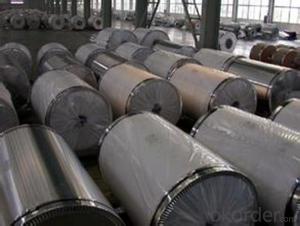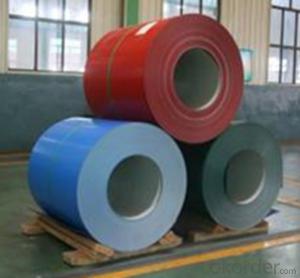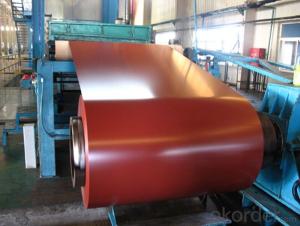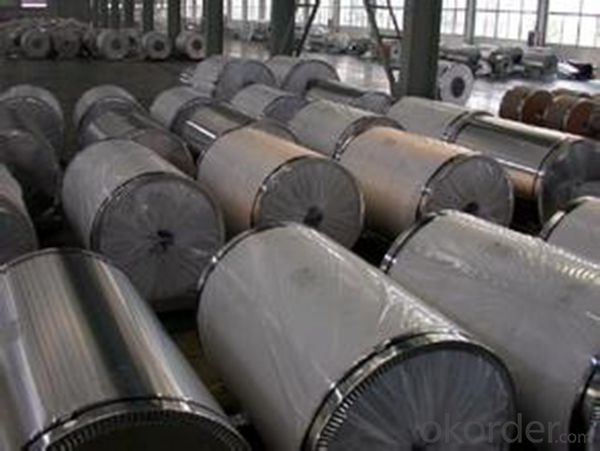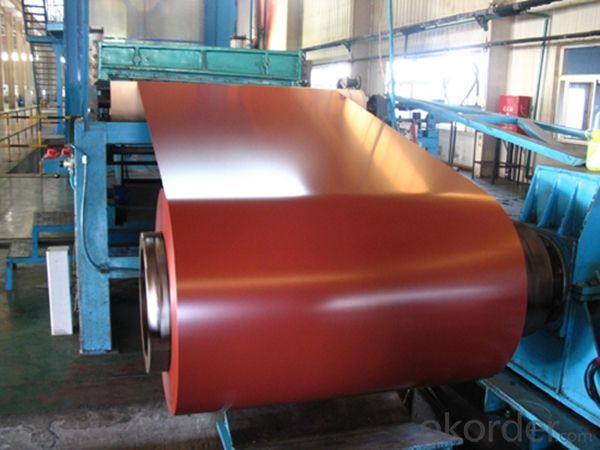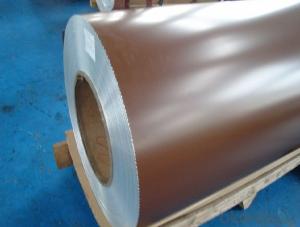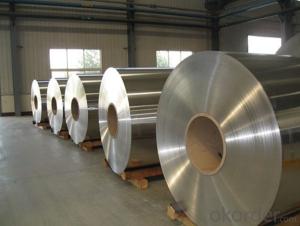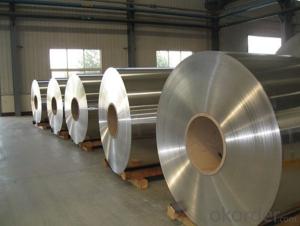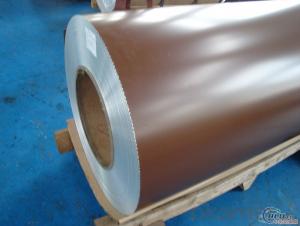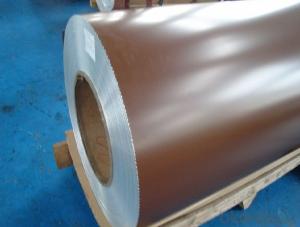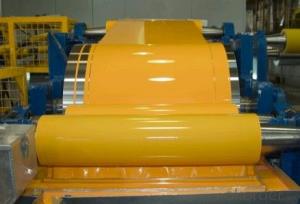Aluminum Coil Toronto - Color Coated 3003 Aluminum Coil China Supply for Sale
- Loading Port:
- Shanghai
- Payment Terms:
- TT OR LC
- Min Order Qty:
- 5 m.t.
- Supply Capability:
- 10000 m.t./month
OKorder Service Pledge
OKorder Financial Service
You Might Also Like
Specification
1. Specification of Color Coated 3003 Aluminum Coil China Supply for Sale
Material | Alloy Aluminum 6063,6061,6005 or customer nominated |
Temper | T3, T4, T5, T6 |
Surface | Anodize, electrophoresis, powder coating, PVDF coating, wood grain painting, matted, etc. |
Colour | Any colour based on Standard Germany RAL Mark |
Length | Coating 6.5 meters, Anodizing 6.5 meters, Mill finish 5 meters |
Press Machine | 500-4000 tons all together 64 press lines. |
Fabrication | 1. Windows and doors; 2. Drilling; 3. Bending; 4. Cutting; 5. etc. |
Certificate | ISO 9001 |
Moulding | 1. Using our moulds, no fee; |
2. Using customer drawing, opening mould, usually about 10~50 tons then the moulding can be refunded. | |
3. Mould cost is negotiable base on the order quantity | |
Capability | Annual output 100,000 tons |
2. Application of Color Coated 3003 Aluminum Coil China Supply for Sale
(1).Interior: wall cladding, ceilings, bathrooms, kitchens and balconies, shutters, doors...
(2).Exterior: wall cladding, facades, roofing, canopies, tunnels,column covers , renovations...
(3).Advertisement: display platforms, signboards, fascia, shop fronts...
3. Feature of Color Coated 3003 Aluminum Coil China Supply for Sale
*Such coil is specially designed to replace aluminum ingot, due to the high export tax of aluminum ingot, the coil has better price than ingot.
*This type of coil can fit customer's remelting furnace just like ingot, no need to make any change to the production line that was previously used for ingot. The standard coil size and weight is very suitable for the feed gate of furnace.
*This type of coil causes less material wastage than ingot when remelted.
*Our coil is made directly from ore, no need to go though the ingot making process, quality is much better than other suppliers who use ingot scrap to make coil.
Be free from Oil Stain, Dent, Inclusion, Scratches, Stain, Oxide Dicoloration, Breaks, Corrosion, Roll Marks, Dirt Streaks and other defect which will interfere with use
4. Certificate:
SGS and ROHS(if client request, paid by client), MTC(plant provided), Certificate of Origin(FORM A, FORM E, CO), Bureau Veritas and SGS (if client request, paid by client), CIQS certificate
5. Image of Color Coated 3003 Aluminum Coil China Supply for Sale
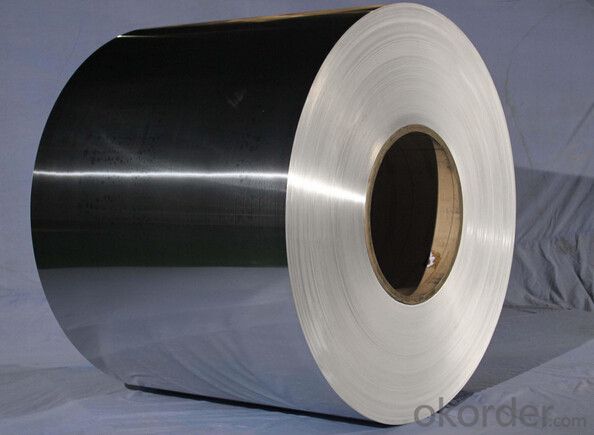
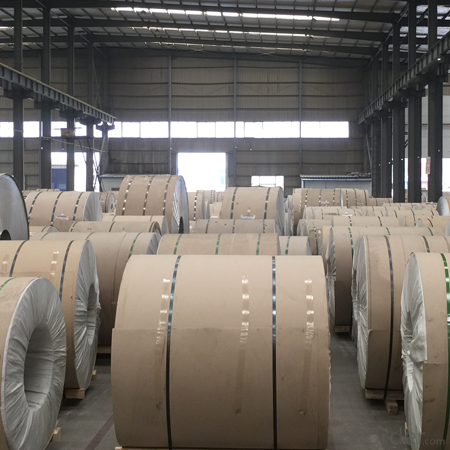
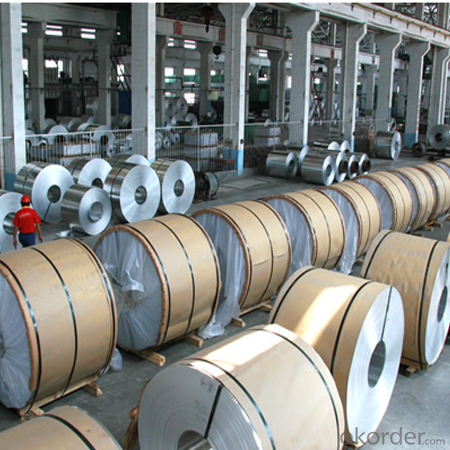
6. Package and shipping of Color Coated 3003 Aluminum Coil China Supply for Sale
eye to wall
eye to the wall
with wood pallet (wooded case also available)
7. FAQ
1) What is the delivery time?
Dpends on actual order, around 20 to 35 days
2)What is the QC system:
We have QC staff of 20 persons and advanced equipment, each production is with MTC traced from Aluminum ingot lot.
3) What market do you mainly sell to?
Australia, America, Asia, Middle East, Western Europe, Africa etc
- Q: Can aluminum coils be used in solar panel installations?
- Yes, aluminum coils can be used in solar panel installations. Aluminum is a popular choice for the construction of solar panels due to its lightweight nature, corrosion resistance, and excellent thermal conductivity. Aluminum coils are often used as the backing material for solar panels, providing structural support and heat dissipation. They are also commonly used in the manufacturing of solar mounting systems, which hold the panels securely in place. Overall, aluminum coils are a reliable and efficient option for solar panel installations.
- Q: What are aluminum coils used for?
- Aluminum coils are commonly used in various industries, such as construction, automotive, and HVAC, for their excellent thermal conductivity and corrosion resistance properties. They are primarily used for manufacturing heat exchangers, air conditioning systems, refrigeration units, and other heat transfer applications.
- Q: What is an aluminum coil?
- An aluminum coil is a continuous strip or sheet of aluminum that is wound into a coil shape. It is typically used in various industries for its lightweight, corrosion-resistant, and malleable properties. The coil is produced through a process called continuous casting and rolling, where molten aluminum is poured into a caster and then rolled between large metal rollers to achieve the desired thickness and shape. Aluminum coils are commonly used in the manufacturing of automotive parts, building materials, electrical equipment, and packaging materials. They can be further processed into different forms, such as sheets, plates, or foils, depending on the specific application requirements.
- Q: My grandpa died from Alzheimer’s disease, I didn't know what it was but I came across something slightly disturbing. There were several blog and research sites linking Sodium Aluminum Phosphate ((you know the stuff in bisquick pancake batter stuff or maybe eggo waffles)) what bothered me is that two root words of that ingredient bothers me aluminum Phosphate ((is that like phospherous, as in phospherous paint...didn't that turn out bad to the body?)) If so maybe I need a second opinion or ensurance that it is real or not if it is I'm not eating pancakes again. Please help answer this.
- Yes I agree with what's been said so far
- Q: The company wants to produce an aluminum coil production line, which is better for large aluminium smelting equipment?
- Dongpu heat well, they have the qualification certificate issued by the state kiln construction, as far as I know, their melting furnace Aluminum Alloy 'plan is very good, and the operation is simple and safe, feel good, can be wiped off
- Q: How do aluminum coils contribute to sustainable manufacturing practices?
- The numerous environmental and economic benefits of aluminum coils make them crucial for promoting sustainable manufacturing practices. To start, aluminum is an incredibly recyclable material, with almost 75% of all aluminum ever produced still in use today. This means that aluminum coils can be recycled and reused multiple times without losing their quality or performance. Unlike producing new aluminum, recycling aluminum requires only a fraction of the energy, resulting in significant energy savings and reduced greenhouse gas emissions. Furthermore, the lightweight nature of aluminum coils contributes to energy efficiency in transportation and reduces fuel consumption during shipping. This characteristic allows for more efficient use of resources, as less material is needed to achieve the same strength and durability compared to other metals. Consequently, this not only reduces the overall weight of products but also lowers the energy required for their fabrication and transportation. Moreover, the excellent corrosion resistance of aluminum coils extends their lifespan and reduces the need for frequent replacement. This factor not only saves resources but also reduces waste generation and associated environmental impacts. Additionally, aluminum coils are non-toxic and do not release harmful substances into the environment, making them a safe and sustainable choice for various manufacturing applications. In terms of economic benefits, aluminum coils contribute to sustainable manufacturing practices by offering cost savings throughout their lifecycle. The recyclability of aluminum reduces the need for raw material extraction, thereby lowering operational costs and dependence on virgin resources. Additionally, the lightweight nature of aluminum coils allows for more efficient use of energy and resources, resulting in reduced manufacturing and transportation costs. In conclusion, aluminum coils are essential for promoting sustainable manufacturing practices due to their recyclability, lightweight nature, corrosion resistance, non-toxicity, and cost-saving benefits. By integrating aluminum coils into manufacturing processes, companies can reduce their environmental footprint, conserve resources, promote energy efficiency, and contribute to a more sustainable and greener future.
- Q: What are the maximum operating temperatures for aluminum coils?
- The specific alloy and application used can determine the maximum operating temperatures for aluminum coils. In general, aluminum coils can endure high temperatures without significant degradation or performance problems. Common aluminum alloys like 3003 and 5052 have a maximum operating temperature of approximately 300-400 degrees Fahrenheit (150-200 degrees Celsius). These temperatures are suitable for most industrial and commercial uses, including HVAC systems, refrigeration units, and heat exchangers. Specialized aluminum alloys, such as 4004 and 4343, are designed for high-temperature applications. These alloys can withstand temperatures up to 550-650 degrees Fahrenheit (290-340 degrees Celsius) without significant structural or performance damage. It's important to note that the maximum operating temperature can vary depending on factors like coil thickness, heat transfer conditions, and duration of exposure to high temperatures. Therefore, it is advisable to consult the manufacturer's guidelines or perform temperature tests to determine the safe operating limits for a specific aluminum coil in a particular application.
- Q: What are some common applications for aluminum coils?
- Some common applications for aluminum coils include manufacturing of roofing materials, HVAC systems, automotive parts, electrical wiring, packaging materials, and construction materials.
- Q: How do aluminum coils compare to other metal coils like steel or copper?
- Aluminum coils offer several advantages and disadvantages when compared to other metal coils like steel or copper. In terms of weight, aluminum coils are significantly lighter than steel coils. This makes them easier to handle and transport, which can reduce costs in the manufacturing and construction industries. On the other hand, steel coils are much stronger and more durable than aluminum, making them more suitable for heavy-duty applications where strength is crucial. In terms of corrosion resistance, aluminum coils have a natural oxide layer that protects them from rust and corrosion. This makes them an excellent choice for outdoor applications or environments with high humidity. Copper coils also have excellent corrosion resistance, but steel coils are more prone to rust and require additional protective coatings. Thermal conductivity is another factor to consider. Copper is known for its exceptional thermal conductivity, making it highly efficient for applications that require heat transfer, such as HVAC systems. Aluminum coils have lower thermal conductivity than copper, but they are still widely used in various heat transfer applications due to their lightweight and cost-effectiveness. Cost is a significant consideration when comparing different metal coils. Aluminum coils are generally more affordable than copper and steel coils, which makes them a popular choice for many industries. However, steel coils are often the most cost-effective option for heavy-duty applications due to their strength and durability. Overall, the choice between aluminum, steel, or copper coils depends on the specific requirements of the application. Each metal has its own unique properties and advantages, and selecting the right material involves considering factors such as weight, strength, corrosion resistance, thermal conductivity, and cost.
- Q: Can a rolling machine be utilized to transform aluminum coils into flat sheets?
- <p>Yes, you can use a rolling machine to roll aluminum coils into sheets. Rolling machines are specifically designed to apply pressure and reduce the thickness of metal coils, such as aluminum, into thinner, flatter sheets. The process involves passing the aluminum coil through the rolling mill, where it is compressed between rollers. This process can be repeated to achieve the desired thickness and flatness of the aluminum sheet. It's important to ensure the rolling machine is suitable for aluminum and that the appropriate settings are used to avoid damaging the material or the machine.</p>
Send your message to us
Aluminum Coil Toronto - Color Coated 3003 Aluminum Coil China Supply for Sale
- Loading Port:
- Shanghai
- Payment Terms:
- TT OR LC
- Min Order Qty:
- 5 m.t.
- Supply Capability:
- 10000 m.t./month
OKorder Service Pledge
OKorder Financial Service
Similar products
Hot products
Hot Searches
Related keywords
